
Enos Edward "Yakima" Canutt was an American champion rodeo rider, actor, stuntman, and action director. He developed many stunts for films and the techniques and technology to protect stuntmen in performing them.

Gunfight at the O.K. Corral is a 1957 American Western film starring Burt Lancaster as Wyatt Earp and Kirk Douglas as Doc Holliday, and loosely based on the actual event in 1881. The film was directed by John Sturges from a screenplay written by novelist Leon Uris. It was a remake of the 1939 film Frontier Marshall starring Randolph Scott, which was until 1957 the definitive film of the gunfight story.

William Brocius, better known as Curly Bill Brocius, was an American gunman, rustler and an outlaw Cowboy in the Cochise County area of the Arizona Territory during the late 1870s and early 1880s. His name is likely an alias or nickname, and some evidence links him to another outlaw named William "Curly Bill" Bresnaham, who was convicted of an 1878 attempted robbery and murder in El Paso, Texas.

The Cowboys is a 1972 American Western film starring John Wayne, Roscoe Lee Browne, and Bruce Dern, and featuring Colleen Dewhurst and Slim Pickens. It was the feature film debut of Robert Carradine. Based on the 1971 novel of the same name by William Dale Jennings, the screenplay was written by Irving Ravetch, Harriet Frank, Jr., and Jennings, and the film was directed by Mark Rydell.

The Star Packer is a 1934 Western film directed by Robert N. Bradbury and starring John Wayne, George "Gabby" Hayes, Yakima Canutt, and Verna Hillie.

Randy Rides Alone is a 1934 American Pre-Code Western film starring John Wayne, Yakima Canutt, and George Hayes. The 53-minute black-and-white film was directed by Harry L. Fraser, produced by Paul Malvern for Lone Star Productions, and released by Monogram Pictures.

The Lucky Texan is a 1934 American Lonestar Films B-movie Western film featuring John Wayne, Barbara Sheldon, Gabby Hayes, and the legendary stuntman and actor Yakima Canutt. It was written and directed by Robert N. Bradbury. It also contains a rare appearance by "Gabby" Hayes without a beard and in drag.

'Neath the Arizona Skies is a 1934 Western film directed by Harry L. Fraser, produced by Lone Star Productions, released by Monogram Pictures and starring John Wayne. Wayne's character attempts to locate a little girl's father, so that she may claim a $50,000 Indian oil claim. The film co-stars Sheila Terry and Shirley Jean Rickert. George "Gabby" Hayes played a featured character with a speaking role, but his name was omitted from the cast list in the opening credits.
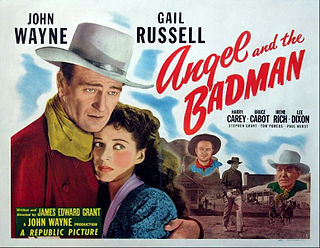
Angel and the Badman is a 1947 American Western film written and directed by James Edward Grant and starring John Wayne, Gail Russell, Harry Carey and Bruce Cabot. The film is about an injured gunfighter who is nursed back to health by a young Quaker woman and her family whose way of life influences him and his violent ways. Angel and the Badman was the first film Wayne produced as well as starred in, and was a departure for this genre at the time it was released. Writer-director James Edward Grant was Wayne's frequent screenwriting collaborator.
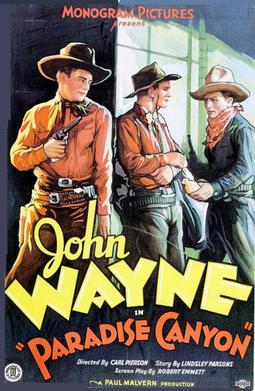
Paradise Canyon is a 1935 Western film starring John Wayne, directed by Carl L. Pierson. The film was Wayne's final Monogram Pictures/Lone Star Production Western. The film was released years later in a colorized version on home video/dvd under the title Guns Along the Trail.
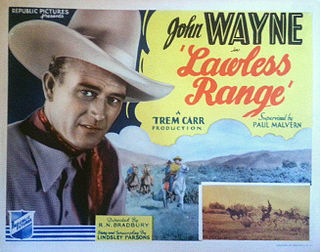
Lawless Range is a 1935 American Western film released by Republic Pictures, directed by Robert N. Bradbury and starring John Wayne. He appears as a "singing cowboy" in the film, with his singing voice dubbed by Glenn Strange, who later found lasting film fame himself as Frankenstein's Monster.

Riders of Destiny is a 1933 pre-Code Western musical film starring 26-year-old John Wayne as Singin' Sandy Saunders, the screen's second singing cowboy. It was the first of a series of sixteen Lone Star Westerns made for Monogram Pictures between 1933-1935, by Wayne and director Robert N. Bradbury, and the first pairing of Wayne with George "Gabby" Hayes.

The Telegraph Trail is a 1933 American pre-Code Western film directed by Tenny Wright and starring John Wayne and Frank McHugh. The film also starred stuntman Yakima Canutt as Indian Chief High Wolf, Marceline Day as the heroine, and Duke the Wonder Horse as John Wayne's trusty steed.
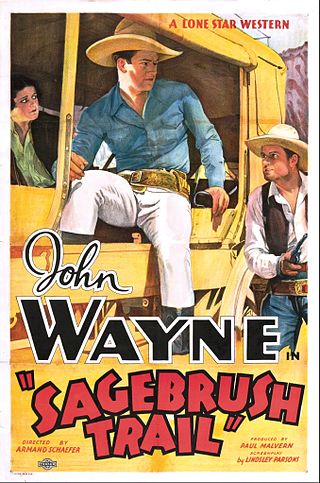
Sagebrush Trail is a 1933 American Pre-Code Western film with locations filmed at Bronson Canyon starring John Wayne and featuring Lane Chandler and Yakima Canutt. It was the second Lone Star Productions film released by Monogram Pictures. It was shown as An Innocent Man in the UK, and this version was later released in a colorized version on home video.

The Last Frontier is an American Pre-Code 12-chapter serial, distributed by RKO Radio Pictures in 1932. The story was based on the novel of the same name by Courtney Ryley Cooper.

Clifford William Lyons was an American film actor, stuntman and second unit director, primarily of Westerns and particularly the films of John Ford and John Wayne. His Hollywood contemporaries were unanimous in describing him as “a driven taskmaster”.
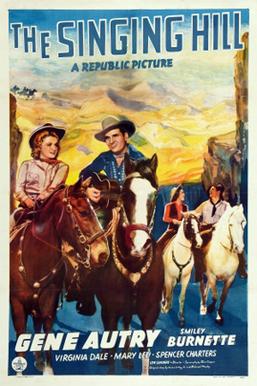
The Singing Hill is a 1941 American Western film directed by Lew Landers and starring Gene Autry, Smiley Burnette, and Virginia Dale. Based on a story by Jesse Lasky Jr. and Richard Murphy, the film is about a singing cowboy and foreman of a ranch that may be sold to an unscrupulous banker by the young madcap heiress who is unaware that the sale will result in the local ranchers losing their free grazing land and their ranches. In the film, Autry introduced the song "Blueberry Hill" which would become a standard recorded by such artists as Louis Armstrong (1949), Fats Domino (1956), and Elvis Presley (1957). The song became one of Autry's best-selling recordings. In 1987, "Blueberry Hill" received an ASCAP Award for Most Performed Feature Film Standards on TV.

Al Taylor was an American character actor during the silent and sound film eras.

Prairie Thunder is a 1937 American Western film directed by B. Reeves Eason and written by Ed Earl Repp. The film stars Dick Foran, Janet Shaw, Frank Orth, Wilfred Lucas, Albert J. Smith and Yakima Canutt. The film was released by Warner Bros. on September 11, 1937. It was the last of 12 B-westerns Foran made for Warners as a singing cowboy from 1935 to 1937.

Cyclone of the Saddle is a 1935 American Western film directed by Elmer Clifton, starring Rex Lease, Janet Chandler, Bobby Nelson, and Yakima Canutt.




















